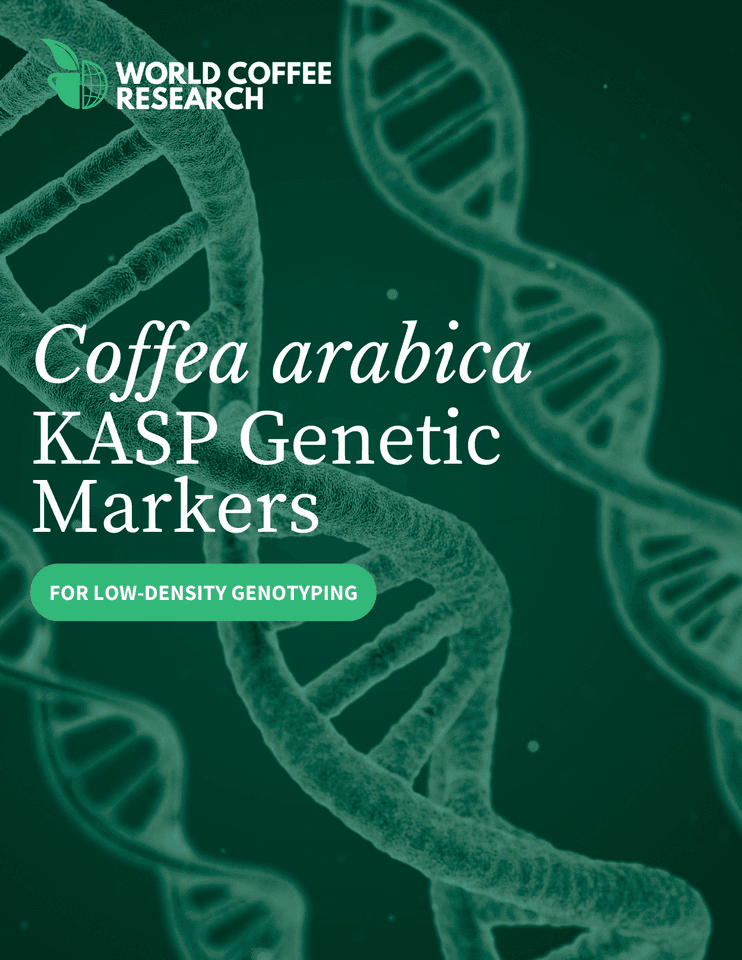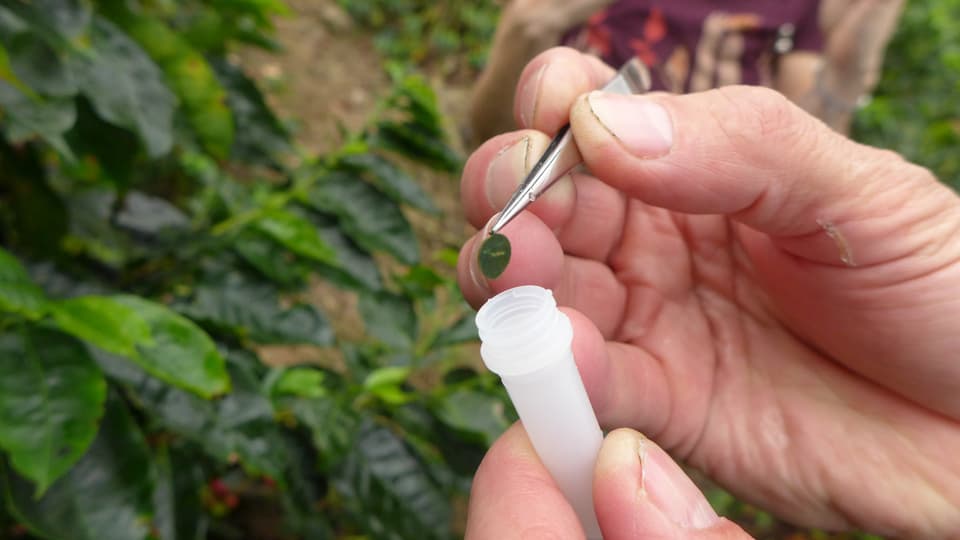
Coffee arabica KASP genetic marker panel for low-density genotyping
Summary
This database of molecular SNP KASP markers can be used to build quick, low-cost, and definitive genetic fingerprints to authenticate specific arabica coffee varieties. The database is available for open-access download by researchers and commercial genotyping service providers.
Determining the genetic makeup of a plant—the specific variety, otherwise known as its “genotype”—is important at many steps along agricultural supply chains. World Coffee Research, in partnership with plant breeders and genomics experts from around the world, has refined a pre-existing set of SNP markers to precisely determine the genotypic profiles of some of the most commonly recognized coffee varieties in Latin America. This reference panel of SNP-based genetic markers serves as a crucial tool in providing affordable genotyping services to coffee producers globally. By granting farmers access to the finest authenticated varieties, this resource establishes a strong foundation for creating value in the coffee industry.
Key information
- 45 SNP markers
- 23 varieties from Latin America that can be authenticated using the reference panel
- 1424 samples were used to build the reference panel
- Samples collected from 5 countries (Guatemala, El Salvador, Costa Rica, Honduras, Peru)
- Partners that provided support to this project (including access to samples, logistics support, and/or genotyping data): USDA ARS, CATIE, ICAFE, IHCAFE, ANACAFE
- Funding provided by: WCR member companies, the MOCCA program
Using the database
This is an open-access dataset that is designed to be used freely by scientists and technical experts in plant genomics. It enables low-cost, high-throughput genotyping services to be developed by commercial providers and national coffee research institutions for use in breeding and for seed/plant quality control.
A commercial genotyping service offered by Intertek Agritech has been developed for coffee using this reference panel. WCR has worked with Intertek Agritech to ensure that this ISO-certified service can be utilized by the coffee community for high-quality analysis and timely date delivery. The approach puts genotyping quality and cost on par with many elite private sector companies.
For pricing and/or to use this service, contact Intertek Agritech directly by emailing (agritech@intertek.com).
Please see the FAQ section below for more information on the database and its uses.
Accessing and citing the database
This data set is being made available for public use without restriction, following the Creative Commons Zero (CC0) Framework. To the extent possible under law, World Coffee Research has waived all copyright and related or neighboring rights to "Coffea arabica KASP genetic markers for low-density genotyping." This work is published from the United States.

Please cite World Coffee Research as the creator of this work as follows:
World Coffee Research. (2023). Coffea arabica KASP genetic markers for low-density genotyping. [Dataset]. World Coffee Research. https://worldcoffeeresearch.org/resources/arabica-ldp-snp-marker-panel.

World Coffee Research releases open-access Coffea arabica genetic fingerprinting database
Varieties covered by dataset
# | Variety Name | Geography | Pedigree/Genetic Background |
1 | Latin America | (Timor Hybrid 832/1 x Caturra) x Pacamara | |
2 | Worldwide | Bourbon | |
3 | Catigua MG2 | Latin America | Catuai amarillo IAC 86 X HdT UFV 440-10 |
4 | Africa, Asia | Timor Hybrid 832/1 x Caturra | |
5 | Latin America | Mundo Novo X Caturra | |
6 | Catuai Amarillo | Latin America | Mundo Novo X Caturra |
7 | Worldwide | Caturra | |
8 | Caturra Amarillo | Worldwide | Caturra |
9 | Centroamericano (H1) | Latin America | T5296 X Rume Sudan |
10 | Latin America | Caturra X CIFC 832/1 | |
11 | Latin America | Selection of T5296 (Timor Hybrid CIFC 832/2 x Villa Sarchi) | |
12 | Icatu | Latin America | C canephora X Bourbon Rojo |
13 | Latin America | Timor Hybrid 832/1 x Caturra | |
14 | Latin America | A natural mutation of Typica | |
15 | Latin America | Timor Hybrid 832/2 x Villa Sarchi CIFC 971/10 | |
16 | Latin America | Timor Hybrid 832/2 x Villa Sarchi CIFC 971/10 | |
17 | Latin America | Timor Hybrid 832/1 x Caturra | |
18 | Latin America | Pacas x Maragogype | |
19 | Latin America | A natural mutation of Bourbon | |
20 | Latin America | A natural mutation of Typica | |
21 | Latin America | Selection of T5296 (Timor Hybrid CIFC 832/2 x Villa Sarchi) | |
22 | San Pacho | Latin America | Caturra X San Bernardo |
23 | Worldwide | Typica |
Frequently asked questions (FAQs)
Below, you can find the answers to various FAQs about this resource and its intended uses.
Determining the genetic makeup of a plant—the specific variety, otherwise known as its “genotype”—is important at many steps along agricultural supply chains. Genotyping tools are regularly used in commercial crops by both industry and the scientific community to authenticate varieties, understand genetic diversity and design more efficient breeding schemes. Recent technological advances have created accurate, repeatable, inexpensive, and rapid options for the genetic identification of plants. A method of testing that analyzes the presence of single-nucleotide polymorphism (SNP) markers has become the method of choice for genotyping in many plant species. The pattern of these tiny variations dispersed through a plant’s DNA sequence can be used to create a genetic “fingerprint” for a variety. SNP markers are accurate and can be analyzed quickly and at a much lower cost than other genetic markers. Because of these advantages, SNPs have become the marker of choice for variety identification in plants.
Kompetitive Allele Specific (KASP) is a type of competitive real-time Polymerase Chain Reaction (PCR) assay (flourescence-based) that allows for the simultaneous detection and discrimination of specific genetic variations (insertion/deletion, or polymorphisms) at a particular genetic locus.
Low density SNP-KASP genotyping demonstrates a high level of specificity towards a target, making it applicable for quality control analysis (such as variety identification). KASP is cost effectivs, offers rapid turnaround for low-density marker applications, and maintains a low error rate.
In coffee, the vast majority of farmers are not sure which varieties they grow. Seed producers, nurseries, farmers, and supply chain actors do not have the needed tools to identify and trace varieties as they move from seed gardens to nurseries, from nurseries to farmer fields, from the field to the port, and from there into roasting drums around the world. This is especially important for seed providers, who mass produce seeds or plants for farmers. Enabling the creation of low-cost, rapid genotyping tools supports the professionalization of the coffee nursery and seed sector globally by enabling seed providers and nurseries to produce adequate volumes of genetically pure and healthy seedlings to coffee farmers. Ultimately, this will result in expanded access to improved, resilient varieties, leading to increased production and profits. It reduces farmer risk and strengthens needed renovation programs in target countries.
Please refer to the table at the bottom of this page to see a complete list of varieties covered by the dataset.
This is an open-access dataset that is designed to be used freely by scientists and technical experts in plant genomics. It enables low-cost, high-throughput genotyping services to be developed by commercial providers and national coffee research institutions for use in breeding and for seed/plant quality control.
These markers have been validated by World Coffee Research on over 30,000 samples in six countries (Guatemala, Honduras, El Salvador, Nicaragua, Costa Rica and Peru) between 2021 and 2023.
Yes. A commercial genotyping service offered by Intertek Agritech has been developed for coffee using this reference panel. WCR has worked with Intertek Agritech to ensure that this ISO-certified service can be utilized by the coffee community for high-quality analysis and timely date delivery. The approach puts genotyping quality and cost on par with many elite private sector companies.
For pricing and/or to use this service, contact Intertek Agritech directly by emailing agritech@intertek.com
For questions about commercial testing, contact Agritech (agritech@intertek.com).
For questions about this dataset, including suggested improvements, contact Santos Barrera at World Coffee Research (santos@worldcoffeeresearch.org).